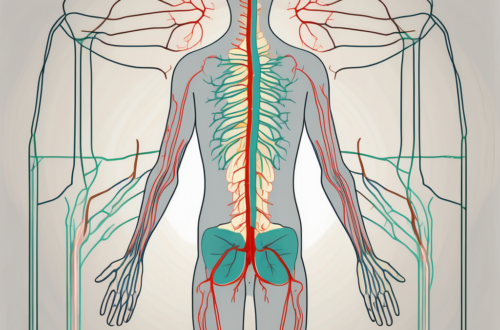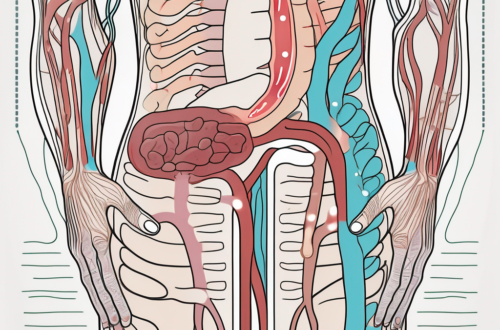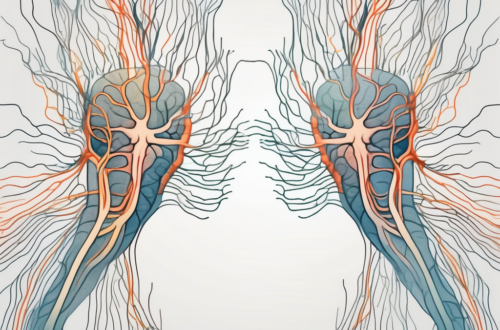The parasympathetic nervous system is a crucial component of the autonomic nervous system, playing a vital role in regulating many bodily functions. Understanding the mechanisms and effects of parasympathetic nerve regulation is essential for comprehending the complex interplay between our body and mind. In this article, we will delve deep into the impact of parasympathetic nerve regulation, shedding light on its effects and uncovering the therapeutic implications it holds.
Understanding Parasympathetic Nerve Regulation
Before we delve into the diverse impacts of parasympathetic nerve regulation, it is crucial to grasp the fundamentals of how this intricate system operates. The parasympathetic nervous system is part of the autonomic nervous system, alongside the sympathetic nervous system. While the sympathetic system is responsible for the “fight or flight” response, the parasympathetic system acts as the counterpart, promoting rest, relaxation, and homeostasis.
The Role of the Parasympathetic Nervous System:
One of the primary functions of the parasympathetic nervous system is to regulate various bodily activities during rest or non-stressful situations. It maintains a delicate balance by conserving energy, promoting digestion, and regulating heart rate, among other functions. By stimulating the parasympathetic system, our body can achieve a state of calmness and rejuvenation.
The Mechanism of Parasympathetic Nerve Regulation:
Parasympathetic nerve regulation occurs through the release of acetylcholine, a neurotransmitter that binds to specific receptors on target cells. This binding activates a cascade of intracellular pathways, ultimately leading to physiological changes in various organs and tissues. The parasympathetic nerves, originating primarily from the cranial nerves and sacral spinal cord, innervate numerous organs throughout the body.
The parasympathetic nervous system plays a crucial role in maintaining homeostasis within the body. When activated, it promotes rest and relaxation, allowing the body to conserve energy and recover from physical or mental exertion. This system is responsible for slowing down heart rate, reducing blood pressure, and increasing blood flow to the digestive system.
One of the key organs regulated by the parasympathetic system is the gastrointestinal tract. When the body is in a state of rest, the parasympathetic nerves stimulate the release of digestive enzymes and increase blood flow to the digestive organs. This promotes optimal digestion and absorption of nutrients, ensuring that the body receives the necessary fuel for its functions.
In addition to its role in digestion, the parasympathetic system also influences other bodily functions. For example, it plays a significant role in controlling urinary function. When the body is at rest, the parasympathetic nerves stimulate the bladder to contract and the sphincter muscles to relax, allowing for the smooth passage of urine.
Furthermore, the parasympathetic system is involved in regulating sexual function. It promotes sexual arousal by increasing blood flow to the genital area and stimulating the release of vaginal lubrication in females. In males, it triggers the relaxation of smooth muscles in the penis, allowing for increased blood flow and the initiation of an erection.
Overall, the parasympathetic nervous system is a vital component of our autonomic nervous system. It acts as a counterbalance to the sympathetic system, ensuring that our body maintains a state of equilibrium and optimal functioning. By understanding the mechanisms and functions of the parasympathetic system, we can appreciate the intricate workings of our body and the importance of rest and relaxation in maintaining overall health and well-being.
The Impact of Parasympathetic Nerve Regulation on the Body
The effects of parasympathetic nerve regulation touch upon multiple systems within the body, influencing cardiovascular, digestive, and respiratory functions, to name just a few.
The parasympathetic nervous system, often referred to as the “rest and digest” system, plays a crucial role in maintaining homeostasis and promoting overall well-being. By understanding the specific effects of parasympathetic nerve regulation on different systems, we can gain a deeper appreciation for the intricate workings of our body.
Effects on the Cardiovascular System
The parasympathetic nervous system exerts a profound influence on heart rate, promoting a slowing effect by decreasing the activity of the sinoatrial (SA) node, which initiates electrical signals in the heart. This slowing effect allows the heart to adjust its rhythm and conserve energy during restful periods.
Furthermore, parasympathetic stimulation leads to the release of acetylcholine, a neurotransmitter that acts on the heart’s atrioventricular (AV) node. This action slows down the conduction of electrical signals from the atria to the ventricles, allowing for coordinated contractions and efficient blood flow.
However, it is important to note that certain cardiovascular conditions may require medical intervention. If you experience persistent palpitations, chest pain, or any other concerning symptoms related to your cardiovascular health, consulting with a healthcare professional is strongly advised.
Influence on the Digestive System
The parasympathetic nervous system plays a critical role in promoting healthy digestion. Stimulation of the vagus nerve, a major parasympathetic nerve, triggers the release of digestive enzymes, enhances peristalsis (the movement of food through the digestive tract), and increases blood flow to the digestive organs. As a result, our body can effectively break down food, absorb nutrients, and eliminate waste.
In addition to these effects, parasympathetic stimulation also promotes the relaxation of the gastrointestinal sphincters, allowing for the smooth passage of food through the digestive system. This coordinated activity ensures that nutrients are properly absorbed and waste is efficiently eliminated.
If you are experiencing chronic digestive issues or concerns, it is advisable to consult with a gastroenterologist or healthcare professional who specializes in digestive health. They can provide personalized recommendations and interventions to help alleviate your symptoms and optimize your digestive function.
Impact on the Respiratory System
Parasympathetic nerve regulation also influences the respiratory system, primarily by promoting bronchoconstriction and reducing airway resistance. This mechanism helps maintain a balanced exchange of gases in the lungs and aids in regulating respiration during periods of rest or relaxation.
Furthermore, the parasympathetic nervous system plays a role in controlling the depth and rate of breathing. By modulating the activity of the respiratory muscles, it ensures that the oxygen we inhale is efficiently distributed to the body’s tissues and that carbon dioxide, a waste product of metabolism, is effectively eliminated.
If you have respiratory conditions such as asthma or chronic obstructive pulmonary disease (COPD), it is important to work closely with a healthcare professional to manage your symptoms. They can provide you with appropriate medications, lifestyle modifications, and breathing exercises to help optimize your respiratory function and improve your quality of life.
The Parasympathetic Nervous System and Stress Response
The role of the parasympathetic nervous system extends beyond regulating bodily functions and encompasses its involvement in the stress response. When faced with a stressful situation, the parasympathetic nervous system plays a crucial role in promoting relaxation and restoring balance in the body.
One of the key ways in which the parasympathetic nervous system aids in relaxation is through the activation of the “rest and digest” response. This response is responsible for slowing down the heart rate, reducing blood pressure, and increasing digestive activity. By activating this response, the parasympathetic system helps counteract the effects of stress and anxiety, allowing the body to return to a state of equilibrium.
The Role of Parasympathetic Nervous System in Relaxation
The activation of the parasympathetic nervous system promotes relaxation, providing an antidote to the effects of stress and anxiety. Deep breathing exercises, meditation, and other relaxation techniques can help stimulate the parasympathetic system, helping individuals find solace in moments of stress.
Deep breathing exercises, in particular, have been shown to have a profound impact on activating the parasympathetic system. By taking slow, deep breaths, individuals can stimulate the vagus nerve, a key component of the parasympathetic system. This stimulation triggers a cascade of physiological responses that promote relaxation, such as decreased heart rate and increased feelings of calmness.
Furthermore, engaging in activities that bring joy and pleasure can also activate the parasympathetic system. Listening to soothing music, spending time in nature, or engaging in creative pursuits can all help elicit a relaxation response in the body.
It is important to note that while relaxation techniques can be beneficial, they are not a substitute for professional mental health care. If you are experiencing persistent or severe feelings of stress, anxiety, or any other mental health concerns, seeking guidance from a mental health professional is recommended. They can provide personalized strategies and support to help you navigate through challenging times.
Parasympathetic Nervous System and Anxiety
Imbalances in the parasympathetic nervous system can sometimes contribute to anxiety disorders. Researchers have investigated the potential therapeutic effects of modulating the parasympathetic system to alleviate anxiety symptoms. By finding ways to enhance the parasympathetic response, individuals with anxiety disorders may experience a reduction in symptoms and an improved sense of well-being.
One approach that has gained attention is the use of biofeedback techniques. Biofeedback allows individuals to monitor their physiological responses, such as heart rate and muscle tension, and learn how to regulate them. By providing real-time feedback, individuals can develop greater control over their bodily functions, including the activation of the parasympathetic system.
Additionally, certain lifestyle factors can influence the functioning of the parasympathetic system and, consequently, anxiety levels. Regular exercise, sufficient sleep, and a balanced diet have all been shown to support the health of the parasympathetic nervous system. By prioritizing these aspects of self-care, individuals can create an environment that fosters relaxation and reduces anxiety.
However, given the complex nature of anxiety disorders, it is essential to consult with a mental health professional to determine the most appropriate treatment strategies. They can provide a comprehensive assessment and develop a personalized treatment plan that addresses the unique needs and circumstances of each individual.
Therapeutic Implications of Parasympathetic Nerve Regulation
The understanding of parasympathetic nerve regulation has led to several therapeutic interventions aimed at improving well-being and health.
Parasympathetic nerve regulation plays a crucial role in maintaining the body’s homeostasis and promoting relaxation. By activating the parasympathetic nervous system, individuals can experience a decrease in heart rate, blood pressure, and stress levels. This has significant implications for managing various conditions and enhancing overall wellness.
Parasympathetic Nerve Stimulation Therapy
Stimulation of the parasympathetic nervous system through various techniques has shown promising results in managing certain conditions. For example, vagus nerve stimulation has been used to treat epilepsy and depression, with notable success.
Vagus nerve stimulation involves the implantation of a small device that delivers electrical impulses to the vagus nerve, which is responsible for regulating various bodily functions. By stimulating this nerve, the therapy aims to modulate the parasympathetic system and restore balance in individuals with epilepsy or depression.
However, it is crucial to consult with a healthcare professional to determine the suitability and safety of such therapies for individual needs. Each person’s medical history, condition, and overall health must be carefully evaluated before considering parasympathetic nerve stimulation therapy.
Future Directions in Parasympathetic Nerve Regulation Research
The field of parasympathetic nerve regulation continues to evolve, with ongoing research aimed at uncovering novel insights and potential therapies. Scientists are exploring the role of biofeedback, neurofeedback, and other innovative techniques in modulating the parasympathetic system for therapeutic purposes.
Biofeedback is a technique that allows individuals to gain awareness and control over their physiological processes by providing real-time feedback on their bodily functions. By using sensors and monitoring devices, individuals can learn to regulate their parasympathetic response and promote relaxation.
Neurofeedback, on the other hand, involves training individuals to self-regulate their brainwave activity. By monitoring brainwave patterns and providing feedback, individuals can learn to enhance their parasympathetic response and improve their overall well-being.
As research progresses, it is important for individuals to engage in informed discussions with their healthcare providers to stay updated on the latest advancements and potential benefits of these emerging therapies. The field of parasympathetic nerve regulation holds great promise for the development of new therapeutic interventions that can significantly improve the lives of individuals with various health conditions.
Conclusion: The Pervasive Impact of Parasympathetic Nerve Regulation
The parasympathetic nervous system plays a vital role in maintaining balance and enhancing overall well-being. Its effects span across multiple systems within the body, with implications for cardiovascular health, digestion, respiration, stress response, and therapeutic interventions.
While understanding the impact of parasympathetic nerve regulation provides valuable insights, it is important to remember that this article serves as a informative resource and should not be considered a substitute for professional medical advice. Any concerns or questions regarding your health should be discussed with a qualified healthcare professional to receive accurate guidance tailored to your specific needs.
By embracing a holistic approach that considers the interplay between body and mind, we can unlock the potential benefits of parasympathetic nerve regulation and pave the way towards improved well-being.





